Well, Cats: The Movie is out, and it seems like it’s the complete mess that everyone expected it to be. I’m excited to eventually see it (hopefully with friends, inebriated, at 2AM) because I’ve never really seen Cats even though I’ve been aware of it for basically my entire life. Why? Because a trailer for the 1998 direct-to-VHS adaptation of Cats preceded the 2000 direct-to-VHS adaptation of Joseph and the Amazing Technicolor Dreamcoat that I probably watched over 100 times as a kid. From what I can piece together, the only reason that my family owned a copy of this is because at some point my parents went to see Joseph live, and my mom developed a crush on Donny Osmond.

Anyway, Joseph and the Amazing Technicolor Dreamcoat is absolutely buckwild and I want to talk about it while the Andrew Lloyd Webber fervor is still fresh. It’s a story from the Old Testament so also Happy Hanukkah I guess. I’m going to be talking about the 2000 VHS version of Joseph because it is the only version that I’ve seen/care about. If you want to follow along, at time of writing the entire thing is on YouTube. Or so I hear, I’m not a dirty internet pirate. If you want a more legit version, the soundtrack is on Spotify and the show is sung-through so you’ll get some of the effect. I’m not sure I can convey the energy that this show has in words alone.
Joseph is the only piece of Mr. Lloyd Webber’s ouvre that I’ve actually consumed, and as far as his artistic inspiration on this one goes, it’s not much less weird than reading some cat poetry and going “I need to see this on stage performed by actors in skin-tight cat outfits.” For those unfamiliar, the story of Joseph is transplanted almost verbatim from the Book of Genesis. Joseph, youngest son of Jacob (aka Israel, namesake of the modern country), is his father’s favorite and has prophetic dreams that make his eleven brothers jealous. The brothers sell Joseph into slavery in Egypt, but Joseph has God and anime on his side and is able to leverage his dream-interpretation skills to become the Pharaoh’s second-in-command. By interpreting the Pharaoh’s dreams, Joseph helps Egypt avoid a region-wide famine. When Joseph’s brothers travel to Egypt to beg for food, Joseph does a bunch of pranks on them to determine whether they feel real remorse for their actions. He then uses his authority to set aside a region of Egypt for the Israelites to live in. This is why the Israelites were living in Egypt prior to the Exodus.
Joseph and the Amazing Technicolor Dreamcoat is a film adaptation of a sung-through stage musical with music by Andrew Lloyd Webber and lyrics by Tim Rice. It’s a comedy full of pop-culture references and 20th-century anachronisms. Many musical numbers are irreverent parodies of completely unrelated genres: One More Angel In Heaven, for instance, features Joseph’s brothers lamenting their brother’s death in country-music accents before breaking out into a hoedown.
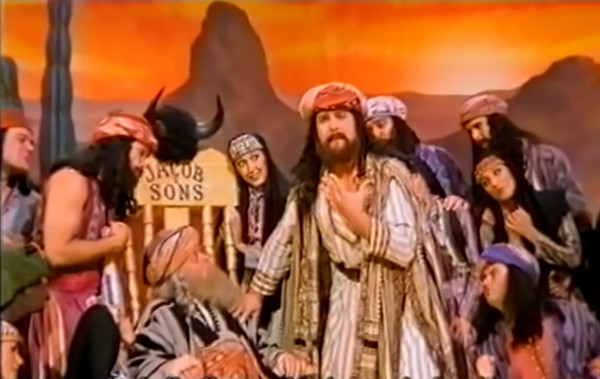 During Go, Go, Go Joseph, the other residents of the ancient Egyptian jail Joseph is locked in reassure him while dressed in crazy disco outfits and a weird hippie stereotype old man wanders around the stage. Joseph (Donny Osmond) is almost naked the entire time.
During Go, Go, Go Joseph, the other residents of the ancient Egyptian jail Joseph is locked in reassure him while dressed in crazy disco outfits and a weird hippie stereotype old man wanders around the stage. Joseph (Donny Osmond) is almost naked the entire time.
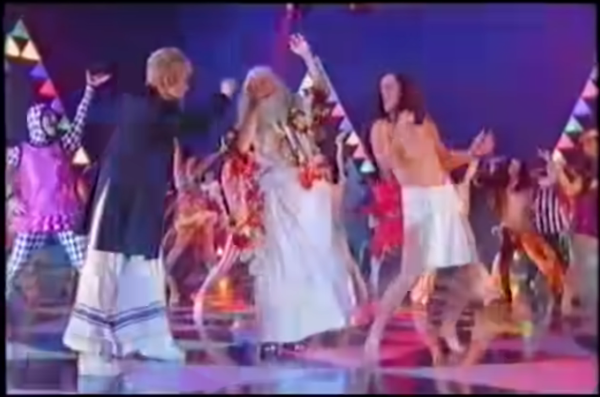 My personal favorite aspect is the Elvis impression that the Pharaoh does for the duration of his time on stage.
My personal favorite aspect is the Elvis impression that the Pharaoh does for the duration of his time on stage.
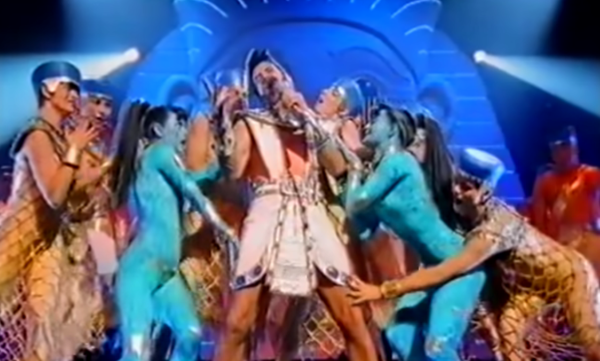
In the VHS version at least, Joseph is a play-within-a-play wherein a Narrator presents the story to a group of school children attending assembly. As far as I can tell, this was purely an excuse to include a children’s choir in a story where the only characters are fourteen adult men. The Narrator is the only woman in the production with major lines (it might be the most important part, actually). I’ve learned from YouTube comments that a lot of people shipped the Narrator and Joseph when they were kids, which is hilarious. The Narrator frequently breaks the fourth wall of the interior play, interacting with the characters and offering snarky asides and facial expressions. The audience also literally crosses the fourth wall occasionally to join the main cast on stage - at one point there’s a visual effect of the children splashing through some sort of metaphysical barrier and arriving in the world of the interior play with their school uniforms transformed into colorful outfits.
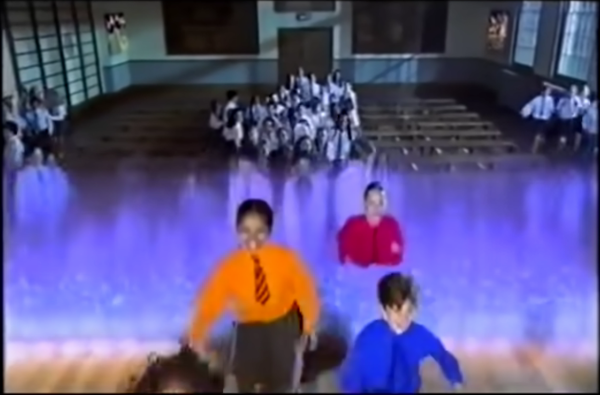
At least to me, the hilarity of Joseph stems from the dissonance between what the show tries to claim about itself and the literal text of the show. On one hand, this is a high-energy pop musical choc-a-block with twentieth century themes about overcoming great adversity and pursuing your dreams and being famous and becoming “a star”. The audience is barraged with modern-day pop culture references, musical parodies, and anachronistic humor, while at the same time the fundamental story of Joseph, mostly just a component of the ethnic history of the Jewish People, is completely unchanged. Seriously, it is absolutely wild to me the degree to which Andrew Lloyd Webber and Tim Rice were able to play with the source material without really changing any of the plot specifics. If you’re ever bored I heavily encourage you to put on your completely legally-acquired copy of Joseph, crack open your nearest Bible to Genesis 37, and see if you can follow along. I’ve matched each musical number to the relevant Bible passages if you want the abridged version.
There is VERY little that Webber/Rice left out of this adaptation. Here’s a list of everything in the Bible’s Joseph story that I noticed to be either changed or missing:
- Joseph’s coat is just “ornate” in the original rather than many-colored, this might just be a translation thing.
- Genesis 37:12-17: Jacob sends Joseph to find his brothers and he has to ask multiple unnamed dudes before he finds them (but it’s a trap).
- Genesis 38 is left out but isn’t even part of the Joseph story so it makes sense.
- Genesis 39: As you might expect, Potiphar was not “one of Egypt’s millionaires” who “made his fortune buying shares in pyramids”. In the original story he’s the captain of the guard.
- The bit with Mrs. Potiphar has also been altered in a way that I’ll talk about later.
- A bunch from Genesis 41 that talks about Joseph’s new life in Egypt and his wife and children is not in the play.
- When the brothers go to Egypt to buy food in Genesis 42, they do not initially bring Benjamin with them. Joseph spends more time messing with them before sending them back home. The brothers return a second time, this time with Benjamin. Joseph treats his brothers to a nice family meal before pulling the shit with the fancy cup.
- In Genesis 45 Joseph gives his brothers land in Egypt in which to live and tells them to return home and bring their father with them. On their way back to Egypt Jacob is reassured by God.
So basically just boring stuff that adds little to the musical’s framing of the plot. Meanwhile, it’s hilarious the things that Webber left in. Right off the bat, the play is completely unapologetic about Jacob being a polygamist. There are repeated references to Jacob’s multiple “wives”, and as a kid I always assumed that when Jacob (played by John Hammond from Jurassic Park) told Joseph that “[Joseph’s] mother was [Jacob’s] favorite wife”, I assumed he’d just remarried after his previous wives had all died because the life expectancy was bad in the olden times. But nope, while Joseph’s mother did in fact pass away, she was in life the favorite of Jacob’s multiple, concurrent wives/concubines. Some of which were his other wives’ “servants”! And Webber kept that in there! I’m not saying that he should have pretended that the Old Testament doesn’t feature polygamy, it’s just hilarious to me that a story so old that this is considered normal was both adapted to the stage and that this aspect is repeatedly referenced but never addressed. They make nods to other ancient-history-isms but never this.
At the same time, we get the first non-frame-story number which is a… biblical genealogy? The most famously dry and uninteresting of the Bible’s many obsolete literary genres, set to music. We get a list of most of the play’s characters, and you can pretty easily pick out which of Joseph’s brothers are going to do things of consequence based on how popular their names are today (in 2019 east-coast America, anyway). Benjamin? He’s definitely going to crush it in this play at some point. Reuben? Prevents the brothers from killing Joseph, commemorated via sandwich. Zebulun? He’s… there.
You can go on an on about how the Bible is not really for kids, and there are a lot of sort of fucked up aspects of the Joseph story that are just left in here and presented as child-friendly. Joseph gets sold into slavery to Ishmaelites (i.e. descendants of Ishmael in the way Israelites are descendants of Israel. According to Wikipedia many Muslim Arab groups claim him as their ancestor) and is a slave for the middle third of the show. There’s a point at which the Narrator sings the line “sold to be a slave” and the camera slowly cuts to two black girls in the audience, which is an… interesting cinematic decision.

Then we come to the Potiphar part. In the Bible, Mrs. Potiphar really likes to sleep around and tries to seduce Joseph (her husband’s slave). When Joseph refuses her advances she accuses him of attempting to rape her and gets him thrown in the dungeons as revenge. Now, having rape be a plot point would be an instant R-rating, so the writers transformed this part into a sexy strip-tease scene where Mrs. Potiphar (soap opera star Joan Collins) sexually assaults Joseph. Mr. Potiphar finds out, Joseph is blamed, and Mr. Potiphar throws Joseph in the dungeons for cuckolding him. And I’m not sure how that’s much better. For starters, the whole sexual-assault-of-a-man-played-for-laughs trope is kind of gross. But moreover, they took what was originally a not very sexy part of this story and made it unbearably horny. It baffles me that this happens in a play that frames itself as being both being a) for children and b) religiously enriching. Every time I watch this movie I laugh uncomfortably through the unfathomable levels of sexual energy this scene gives off - Joseph gets stripped down by the members of Mrs. Potiphar’s harem (???) and then is basically naked for the next forty-five or so minutes of the film. Mrs. Potiphar’s outfit has her boobies just like out there! It’s wild. Why did my parents let me watch this.

One last ancient relic in this play that I want to talk about is the weird standard by which Joseph is framed as a hero. In the Bible he isn’t really framed as necessarily heroic, at the very least he’s just an influential historical figure and that’s all he needs to be. In the context of the Bible, he’s heroic by virtue of being chosen by God, but at the same time he:
- is completely oblivious to how much his brothers resent their father’s favoritism of him, the youngest of twelve sons;
- gloats about having prophetic dreams that imply he’s better than everyone else, antagonizing them even more;
- does eventually forgive his brothers for selling him into slavery but not before fucking with them at length and threatening them with death.
From what I know of heroes out of the ancient near-east, they can be sort of assholes when viewed through a modern-day ethical lens, so this tracks. But in a modern-day context: Joseph is kind of an asshole. I’m not going to say Joseph’s brother’s are justified in selling him into slavery, but come on, Joseph, read the room. It’s not even like he has any character development, he’s more or less a Mary Sue who has things happen to him because other people are jealous of how perfect he is. From a Biblical perspective this is pretty normal but the non-textual elements of the movie frame Joseph as fitting a modern-day model of heroism that he just straight up does not, and it’s really goofy when you start to think about it.
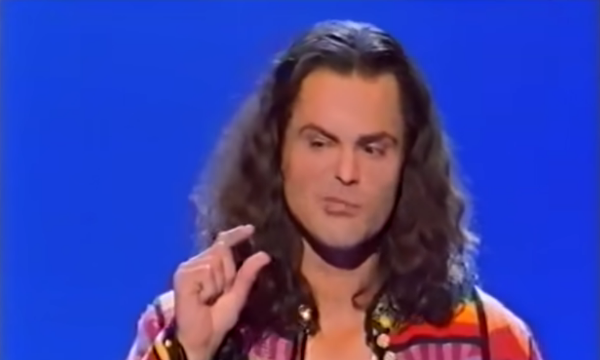
A lot of time in Joseph is spent encouraging the audience to be “dreamers”, that “any dream will do”, and as an adult I’m just over here wondering what on Earth that means. The movie frames Joseph as someone “ahead of his time”, a visionary with innovative, progressive ideas. Despite his setbacks he never stops striving to revolutionize ancient society! But that isn’t what the text of the musical is about at all. Joseph isn’t a visionary, he literally has visions! As a character he’s definitely clever but has also been literally chosen by God to rescue his people from famine. I’m just an armchair theologian over here, but it seems to me the point of the Joseph story (aside from the whole “Joseph being a ‘type’ of Christ” thing) is: a) to be a component of the foundational myth of the Jewish People, and b) to reassure the reader that their suffering is a part of God’s plan, that they should have faith in God and persevere even when things seem bad. But that’s not a very peppy message, and there’s no way to inspire an audience to get really in to dream interpretation and hope they are chosen by God for some great destiny. People can’t really control that. So what you end up with is this 20th century Theater Message™ about “following your dreams” weirdly grafted on to an ethnic origin story from the literal dawn of history about following one’s literal dreams.
As someone who is not Jewish, I’d be really interested to know the importance of Joseph and his story in Jewish pop-culture. Is it iconic enough among Jewish people that adapting it over any other Torah/Old Testament story is an obvious choice? Joseph certainly isn’t a story they talked to us about a ton in Sunday School. This musical was the only reference to it I was aware of until I was an adult, and I had zero context for where in the Bible it happened and what it had to do with Jesus. I just need to know why, after the success of Jesus Christ Superstar, Andrew Lloyd Webber and Tim Rice decided to adapt this story of all things. But since this is the guy who wrote a rock opera about anthropomorphized trains maybe that’s just something we may never know. But maybe that knowledge is out there and I’m just afraid to look, because actually knowing why this play exists would ruin the joke for me.
Anyway, if you’ve gotten this far, thank you for reading this very long post that’s just me being baffled that Joseph and the Amazing Technicolor Dreamcoat is a thing. And before you come to me with “Matt, that’s the joke though!”, I know. The whole premise of this show is ridiculous, and I think everyone involved knew that, and that and the fact that it clearly doesn’t take itself too seriously are part of the reason that I do un-ironically love this show. There’s something about draping a layer of whimsy over top of such archaic subject matter that I find really entertaining. That, and the music is very good. If I ever become a pro wrestler I want the fanfare from the beginning of Jacob and Sons to be my intro music.
